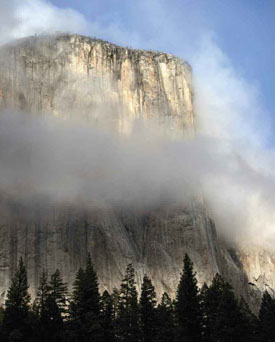Sometimes I wonder how it would have gone if this country had been settled backwards, west to east—if those doughty Pilgrims, huddled praying among the ship’s creaking timbers, had anchored not in the crook of Cape Cod but, say, in San Diego Bay. Would the relentless push that drove us westward have driven us eastward just as fast? Would the Eastern Seaboard have seemed as manifestly destined as the West Coast (which somehow never seems like a “seaboard”) once did? What would all that light and warmth have done to the iron in the Puritan soul? Would the Atlantic states—coming late into our consciousness—have seemed enchanted?
 As it is, things have worked out nicely. California’s climactic geography came last, a necessary if unanticipated coda to what is often called the American experience. Knowing the end of the story—so far— makes it easy to grasp how incomplete this country would have felt without California, the volatile edge, it seems, of all our national imaginings. For much of the way westward, the story was about settling down, finding a homestead and improving it. But California was never really about settling down. Its very geology is transient. This is where you file a claim on the future and hope that events don’t overtake you.
As it is, things have worked out nicely. California’s climactic geography came last, a necessary if unanticipated coda to what is often called the American experience. Knowing the end of the story—so far— makes it easy to grasp how incomplete this country would have felt without California, the volatile edge, it seems, of all our national imaginings. For much of the way westward, the story was about settling down, finding a homestead and improving it. But California was never really about settling down. Its very geology is transient. This is where you file a claim on the future and hope that events don’t overtake you.
It’s hard to live in the everyday way and sustain a mythic consciousness. That’s what I learned going to high school and college in California. My family had crossed into the state over the Sierras, sluiced down 80 into Sacramento. In California, I expected to find a transubstantiated landscape glimmering with intimations of Pacific immortality, and I expected to be transubstantiated in turn. What can I say? We had come from Iowa, and I was 14, an age when the mere house-ness of the house we chose to live in and the car-ness of the car we drove seemed strangely disappointing. I hadn’t expected to find so much ordinariness on display. It seemed as though the Californians who already lived here had lost the magical sense that they were in California. And then I lost it too. It faded away like the San Gabriel Mountains after a hot autumn week without a breeze.
None of us would get much done if we regularly inhabited a mythic consciousness, and the traffic would be so much worse. So much of life seems to require an ordinary perspective, the sameness and familiarity of the normal. There are times when Southern California seems like a vast machine engineered to produce endless quantities of the ordinary. And yet, from time to time, California rises up and smites you, and you find yourself re-dazzled. It may be the sun sinking out at the end of the 10—the “subtropical twilights,” as Joan Didion put it—or a day of purifying desert light. It may be chimney-stacks swaying slightly in a minor earthquake or the sight of the kelp-matted inshore, out beyond which the gray whales move. It may be nothing more than the scent of rain on asphalt in a dry winter. It hardly matters what it is. You look up, look around, and see, again, what an extreme and beautiful place this is, where the continent crumbles and slips and subducts and the weather blows in from the Pacific and the mountains seem like a temporary arrangement, just waiting to slide down into the Inland Empire.
Over the past decade, I’ve come to Claremont and Pomona College every couple of years to teach. I always drive out from my home in New York because I always want to come into California from the great emptiness of Arizona or Nevada. It’s a strange sensation, familiar to nearly everyone who comes this way. You seem to get farther and farther west—to get more and more western—and then you cross into California and the very meaning of “west” changes. You have to look pretty hard to find the “west” in California that’s continuous with the west in, say, Elko, Nevada. But that’s one reason I like California so much—I keep discovering ways in which it’s discontinuous with anywhere else, discontinuous perhaps especially with itself.
I settle in and remember what January smells like in Southern California. The place I left seems unimaginable, part of an old world that seems to contain everything but California. And I wonder again how it would have gone if it had all gone differently. What we have now are the myths that arise historically from the California we came to, not the California we came from. That makes all the difference, as the Pilgrims discovered in their own way and on their own coast.
January 2014
